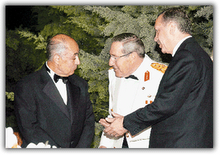Steven A. Cook'un Boston Globe'daki makalesi: "İslamcı bir zaferi alkışlamak"
26 Temmuz 2007
Boston Globe
Cheering an Islamist victory
Steven A. Cook
ON SUNDAY, Turks overwhelmingly voted to return the ruling Islamist Justice and Development Party (AKP) to office with 46.6 percent of the vote. Turkey's two main secular parties did not even come close to this tally, combining for 34 percent of the vote. The stakes in these elections were high, including Turkey's future democratic development, how religion will be accommodated in an officially secular state, and the prospects for Turkey's place in Europe and the Middle East. It is for these reasons that Washington should be relieved that Turkey's Islamists have prevailed. Hardly the firebrands of Hamas and Hezbollah, the leaders of the Justice and Development Party are modernizers who seek a pluralist and democratic Turkey.
Since coming to power in 2002, Justice and Development has done more than any Turkish government to improve and deepen the quality of democracy. To be sure, problems with freedom of expression and individual rights -- especially for Turkey's 14 million Kurds -- remain, but Justice and Development has presided over political and economic reforms that strengthened human rights, overhauled the penal code, improved parliamentary oversight, reined in Turkey's powerful military establishment, and made the Turkish economy the most dynamic in its region. The party will return to parliament with 27 women (more than double any other party) and scores of young, liberal legislators who have joined because they want to live in a democracy.
Conversely, Justice and Development's vanquished rivals -- the Republican People's Party and the Nationalist Movement Party -- are far from paragons of democracy. Both parties have supported the Turkish military's recent intervention in politics intended to weaken the Justice and Development government and prevent one of its members from becoming Turkey's next president. Recently, European social democrats accused the leader of the Republican People's Party of "seeking a Tunisian-type democracy," which is to say no democracy at all. For its part, the Nationalist Movement Party's guiding ideology denies the individual and collective rights of Turkey's Kurdish and other minorities.
The recently published Pew Global Attitudes Survey shows that only 9 percent of Turks approve of the United States. This sentiment is a function of the war in Iraq, which has sowed chaos on Turkey's border, left Turkey vulnerable to terrorism, and raised the specter of Kurdish independence. The Islamists have trafficked in anti-American rhetoric, yet AKP's secular counterparts have been no better and often worse than the Islamists when it comes to the United States. For example, the leaders of the Republican People's Party and Nationalist Movement Party have whipped up anti-American and nationalist sentiment to the extent that large swathes of the Turkish public now identify the United States with the terrorist Kurdistan Worker's Party, or the PKK, which has been attacking Turkey from bases in northern Iraq. At the funerals for Turkish soldiers killed by the PKK, it has become common for Turks to chant "Down, down PKK; Down, down USA."
Turkey's transition to democracy in recent years has had little directly to do with the Bush administration's "forward strategy of freedom in the Middle East," yet Washington should nevertheless welcome the Justice and Development win. Since the party came to power in 2002, the Arab world has taken a keen interest in the way both Europe and the United States deal with Turkey's Islamist government, seeing Turkey as a test case for the West. It is no secret that much of the Arab world has branded Washington's democracy promotion policy as little more than hypocrisy over the Bush administration's unwillingness to recognize Hamas' electoral victory in the January 2006 Palestinian elections. The fact that the Bush administration was the first of Turkey's major allies to congratulate Prime Minister Recep Tayyip Erdogan on the Justice and Development's victory helps to undermine Arab accusations and signals that Washington is not opposed to Islamist power, but rather opposes certain kinds of Islamist groups.
With so much at stake in the Turkish elections, it should be clear that the Justice and Development Party's victory last week was good for the United States. Friction between the two countries over Iraq is likely to continue. Beyond this admittedly difficult problem, however, Justice and Development -- unlike its secularist competitors -- is a better partner for the United States. Turkey's Islamists want to repair relations with Washington, will keep Ankara firmly in the West, and stand for a modern, pluralist, democratic Turkey.
Steven A. Cook is a Fellow at the Council on Foreign Relations and author of "Ruling But Not Governing: The Military and Political Development in Egypt, Algeria, and Turkey."


